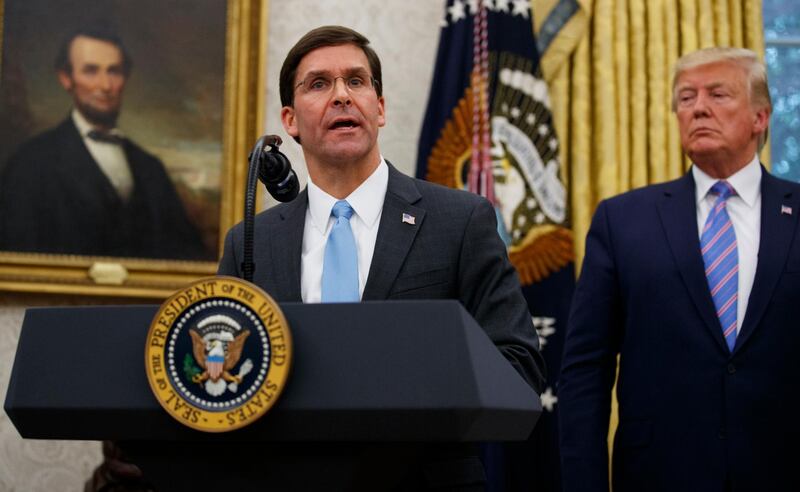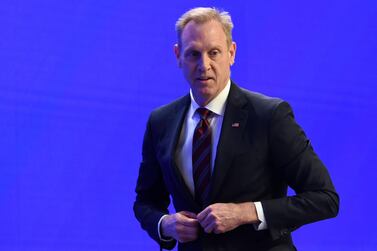Tensions with Iran will be a major priority for the new US Secretary of Defence Mark Esper, after a military and corporate career intersected with links to Washington’s Gulf allies.
The former soldier assumed leadership of the Pentagon on Tuesday following a relatively easy Senate confirmation vote. He was a US army officer during the 1991 Gulf war as part of the US Army's famed 101st Airborne Division known as the "Screaming Eagles". Later he assumed civilian posts in the corporate world.
Educated at West Point and two Ivy League schools, the 55-year-old is the first secretary of defence to hold the position on a permanent basis since General James 'Mad Dog' Mattis resigned last year, over rows with President Donald Trump over Syria and other issues.
Mr Esper’s last civilian job was a senior lobbyist in Washington for Raytheon, the third-largest US military contractor, which conducts huge amounts of business in the Arabian Peninsula.
During his confirmation, Mr Esper faced aggressive questioning from presidential candidate Senator Elizabeth Warren, who voted against him, mainly for Mr Esper’s refusal to pledge that he will not categorically distance himself from arms company Raytheon. Four other presidential candidates in the Senate also voted no but Mr Esper’s was confirmed by a 90 to eight vote.
President Trump's previous pick for secretary of defence, former Boeing co-executive Patrick Shanahan, withdrew from consideration on June 18 after reports emerged of domestic violence in his family.
Mr Esper was born in Uniontown, Western Pennsylvania, an area hard hit as he was growing up because of the decline of the coal and steel industry due to competition from China and elsewhere. He has a PhD in public administration and has worked at the Heritage Foundation, a prominent conservative research centre, as well as a staff member of the Senate Foreign Relations Committee.
Mr Esper served as a congressional aide and a Pentagon official under Republican President George W Bush before working for Raytheon. He had been Army secretary since November 2017.
US Conservatives are viewed with suspicion in Europe, where Mr Esper appears to have struggled to build bridges on his last visit to Brussels in June, despite President Trump’s tough but more measured approach to the continent.
Mr Esper was in Brussels, as acting defence secretary, for a Nato ministerial meeting. His call to build a maritime coalition against Iran fell on largely deaf ears. Britain announced this week that it would be seeking to form a parallel European coalition, although that proposal could also be suffering from what is seen in the continent as an unreliable political leadership.
“We do not seek armed conflict with Iran but we are ready to defend US forces and interests in the region,” Mr Esper said after the meeting. “No one should mistake restraint for weakness.”
Nato as a functioning alliance is under considerable strain, partly from Russia's new military links with Turkey, which has the second largest army in the alliance, and the low regard with which Nato is held by President Trump.
Mr Esper however said in his confirmation that he personally supported Nato and affirmed US commitment to defend any Nato member state if it comes under attack. His difference of view with Mr Trump is largely theoretical for now but it was a swift escalation of differences that had brought about the departure of his widely respected predecessor.







